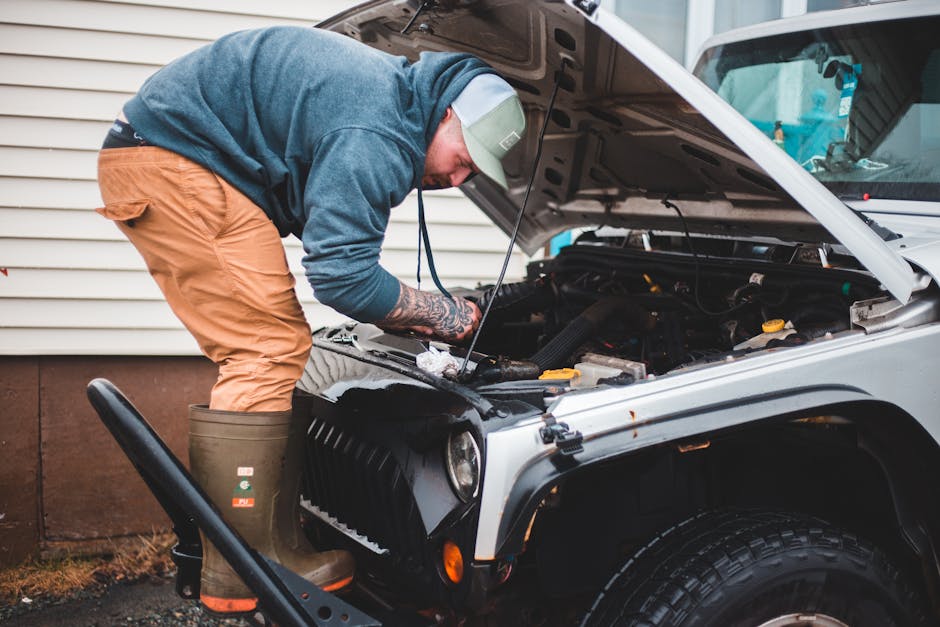How to Troubleshoot Engine Problems Quickly
Car troubles can happen to anyone. You’re driving along, and suddenly, something feels off. What do you do? Knowing how to troubleshoot engine problems quickly can save you time and money. In this guide, we will help you understand common engine issues, what to look for, and how to fix them. Lets dive in!
What Are the Most Common Engine Problems?

Before you can troubleshoot, it’s good to know what you’re up against. Here are some common engine problems:
- Engine won’t Start
- Strange Noises
- Check Engine Light
- Overheating
- Loss of Power
These issues can happen to any driver. Recognizing the signs early can prevent bigger problems down the road.
How Can You Diagnose an Engine That Won’t Start?

Imagine you turn the key, and nothing happens. Frustrating, right? Lets take a few steps to diagnose this issue.
First, check the battery. Is it dead? Look for the headlights or interior lights. If they don’t turn on, your battery might need a jump start.
Next, listen for clicking noises when you turn the key. A clicking sound often means the battery is weak. If you hear no sound at all, it could be the starter motor.
What Should You Do If You Hear Strange Noises?

Does your engine sound like it’s growling or rattling? don’t ignore it! Strange noises can indicate serious trouble.
Here are some noises to listen for:
- Knocking: This might mean low oil levels or bearing wear.
- Hissing: This could indicate a coolant leak.
- Grinding: This often points to a problem with gears or belts.
If you hear these noises, it’s best to have a professional look at it. Continuing to drive can cause more damage.
What Does the Check Engine Light Mean?

The check engine light is like a warning sign. When it lights up, it means something isn’t right. But don’t panic! Heres how to handle it:
First, check your gas cap. A loose or broken cap can trigger the light. Tighten it and see if the light goes off after a few drives.
If the light stays on, you might need a code reader. This handy tool can tell you what’s wrong. Many auto parts stores offer free code reading.
What Causes an Engine to Overheat?
Overheating is serious. If your engine gets too hot, it can cause major damage. Heres what to check:
- Coolant Levels: Make sure your coolant is full.
- Thermostat: If it’s stuck, it can stop coolant flow.
- Radiator: Check for leaks or blockages.
If your engine overheats, pull over immediately. Let it cool down before checking anything!
How Can You Identify Loss of Power?
Feeling like your car is sluggish? A loss of power can stem from various issues. Heres how to pinpoint the problem:
- Fuel System: Low fuel pressure can cause this issue. Check the fuel pump and filter.
- Air Filter: A dirty air filter can choke your engine. Replace it if it’s clogged.
- Spark Plugs: Worn or fouled plugs can impact performance.
Consider taking your vehicle for a tune-up. Regular maintenance helps keep your engine running smoothly.
Why Are Regular Maintenance Checks Important?
Regular maintenance can prevent many engine problems. Think of it like going to the doctor for check-ups. It keeps things running right!
Heres what to keep on your maintenance checklist:
- Oil Changes: Every 3,000 to 5,000 miles.
- Air Filter Replacement: At least once a year.
- Fluid Levels: Regularly check engine, transmission, and coolant fluids.
By staying on top of these tasks, you can avoid unexpected trips to the mechanic.
What Tools Do You Need for Basic Troubleshooting?
Having the right tools can make troubleshooting easier. Heres a list of essentials:
- OBD-II Scanner: For reading error codes.
- Jumper Cables: To jump-start your battery.
- Basic Tool Kit: Wrenches, screwdrivers, and pliers.
These tools can help you get started. Even basic knowledge can go a long way.
What Are Some Common Misconceptions About Engine Problems?
Many people believe myths about engines. Lets clear a few up:
- Myth: All engine lights mean serious trouble.
Fact: Some may be minor, like a loose gas cap. - Myth: You can ignore small noises.
Fact: Small issues can turn into big problems. - Myth: Regular oil changes are unnecessary.
Fact: They keep your engine healthy!
Knowing the truth helps you make better decisions about your car.
How Can You Use Online Resources for Troubleshooting?
The internet is full of resources for car owners. Websites and forums provide valuable information. Many people share their experiences and solutions.
You can also find YouTube videos that show step-by-step guides for common problems. Just search for your specific issue!
For reliable information, check out the Edmunds car repair section. it’s full of tips and advice.
What Are Some Actionable Takeaways?
Engine problems can be daunting, but you can handle them! Here are a few key takeaways:
- Stay calm and assess the situation.
- Know the common issues and what they mean.
- Perform regular maintenance to prevent problems.
- Use tools and resources to help you troubleshoot.
Remember, it’s always okay to ask for help. If something seems too complicated, don’t hesitate to take your car to a professional mechanic.
With this guide, you’re now better equipped to troubleshoot engine problems quickly. Stay safe on the road!
For more tips on car care, check out our post on car maintenance tips!
Happy driving!



